





PERSONAL STORIES Mansour's great love in life was cars. Not able to afford his own, he was a regular customer at Orabi rent-a-car in Al-Bireh, on the outskirts of Ramallah. Once a week he would hire a car and drive friends for a picnic to the Dead Sea, Jericho or Hebron. He liked parties of all kinds, particularly those with traditional Palestinian music and Dabke (Palestinian dance).
"The Street Party"
Mansour Suleiman Shawamrah, "Abu Ismail", aged 22, Ramallah.
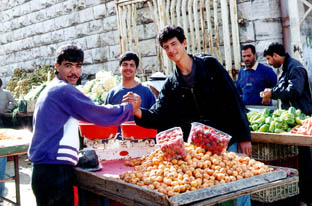
Right: Mansour, on right, shaking hands with a friend, in the Ramallah vegetable market
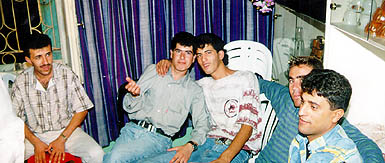
Above: Mansour (center-right) and friends at a party.
Mansour loved children and was very close to his little sister, Narmine. Although only four years old when he died, she still has vivid memories of him taking her for drives to buy biscuits and sweets. When he traveled to Jordan he would bring her back presents, often a dress or bracelets. When asked about his death, Narmine said, "The Israelis killed him but he went to heaven." Every day she recites prayers for him, believing it will make his life in heaven better.
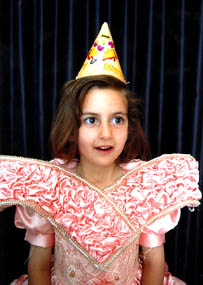
Above: Narmine in a dress that Mansour
brought back from Jordan for her.
Mansour was a hard worker. He had worked in the vegetable market in Ramallah for the last three weeks before his death. For three years before this, he had driven a truck between Jenin and Ramallah, bringing vegetables and fruits to the market. He would often bring things home for the family that he had bought with his wages.
Before his job as a truck driver, Mansour worked for a Jewish family inside Israel with his older brother. He formed a close relationship with them and when this family found out he had left his truck driving job the family had tried to convince him to come back and work for them. After hearing about his death, the Jewish family were grief-stricken. They immediately tried to visit his family in Ramallah but were unable to do so because of the closure of the West Bank in place at the time of the September clashes. When the closure was lifted they visited Mansour's brother in Kalandiya Refugee Camp, and called his parents. Mansour's father still recalls their tears at his son's death.

Above: Mansour's father in the family home.
Mansour came from a large family of 11 children. His mother, Zahra, recalls having a very close relationship with him and he fondly called her by the nickname Ya Zaheera ("the little rose"). Two of his younger brothers were disabled, one of them with half his body paralyzed and the other almost blind. Mansour's father is 70 and still works to support the family. While alive, Mansour was the family's main source of income because his two older brothers are married and are only able to support their own wives and children.

Left: Mansour's mother and younger sister Narmine.
Mansour was himself looking forward to getting married. At one point he had wanted to marry a Palestinian girl from within the 1948 borders of Israel but his parents had not approved. "As you like," Mansour said to his mother, "I give up! You find me a wife!" According to the traditional Arab custom, his mother began looking for a wife for him.
Mansour had grand plans for his wedding. He desperately wanted the event to be held in the streets outside his house in the center of Ramallah. He had already started to buy and store gold and presents for his future wife. Towards the end of his life he had said to his parents, "Unless I'm married soon, I'm going to leave for a long time. I want to go to the USA to work and live."
Mansour had a generous nature and was always willing to help people. His mother tells of an incident in a house across the road. Three families lived in this house - two men with their families, and a women with her son. The two men were trying to evict the women without paying her money owed to her. They bullied and screamed at her. Hearing one of these screaming incidents, Mansour had visited the house and told the men to leave the women alone. They tried to bribe him to forget the matter but he refused. Due to his intervention, the women was eventually paid the money owed to her and is now living peacefully in a new house. She regularly visited Mansour and his family to thank him for what he did, and was heartbroken by his death.
In another incident Mansour had been playing with his brothers and sisters on the roof of the house during a rare snowstorm. He heard a fight occurring in the street below and jumped down from the roof to break up the fight. He never called himself religious and had never learnt to pray. His kindheartedness stemmed from his love of people.
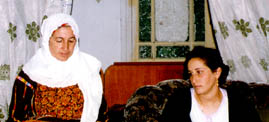
Above: Mansour's mother and sister, whose husband was in prison at the time of the first anniversary of his death.
Mansour was almost two metres tall and his height was the butt of many jokes. At one point during the 1991 Gulf War, despite a curfew banning Palestinians from leaving their houses, Mansour had gone out onto the streets with a friend. He was arrested by an Israeli undercover unit and imprisoned. While in prison he was always the one asked to change lightbulbs by the Israeli guards, because of his height.
His younger brother was normal height but Mansour dwarfed him. For this reason Mansour used to call him Nusf Nasayf ("half the half") after a character in an Arabic folk tale who was a very short thief. He enjoyed teasing his brothers and sisters in fun. Sometimes he would unplug the TV while they were watching, then plug in his stereo and force them to dance with him.
At the age of 22, Mansour was martyred. He died in Ramallah Hospital at 3:00 am on Saturday 28 September 1996. On Thursday 26 September, Along with thousands of others outraged by continued Israeli actions that humiliate the Palestinian people, Mansour had gone to demonstrate at Ma'alufiyya checkpoint near Ramallah, where he was shot in the chest with live ammunition. Mansour was not involved in a political party when he was shot. "Bullets don't differentiate," his father said, "There is nothing written on a man's head. For the Israelis, a Palestinian is just a Palestinian. They don't think about someone's politics when they shoot."
Mansour's father, reminiscing about his son's desire for a wedding party in the streets of Ramallah, said, "It was only at his funeral that we witnessed such a gathering." For days, those passing through Ramallah's Clock Manara where the family home is located, saw a large number of people sitting in chairs on the streets outside, all gathering to express their condolences to Mansour's family.
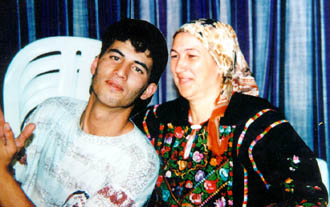
Above: Mansour and his mother in a composite photo made after his death. The importance of "the mother of the martyr" in Palestinian society often encourages families to have a photo made, if none exists.
Back to PERSONAL STORIES or on to the NEXT STORY